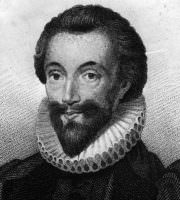About John Donne
John Donne was a famous english poet and cleric in the Church of England. He is considered the pre-eminent representative of the metaphysical poets. His works are noted for their strong, sensual style and include sonnets, love poems, religious poems, Latin translations, epigrams, elegies, songs, satires and sermons. His poetry is noted for its vibrancy of language and inventiveness of metaphor, especially compared to that of his contemporaries. Donne's style is characterised by abrupt openings and various paradoxes, ironies and dislocations. His work has received much criticism over the years, especially concerning his metaphysical form. Donne is generally considered the most prominent member of the metaphysical poets, a phrase coined in 1781 by Samuel Johnson, following a comment on Donne by John Dryden. Along with his frequent dramatic or everyday speech rhythms, his tense syntax and his tough eloquence, were both a reaction against the smoothness of conventional Elizabethan poetry and an adaptation into English of European baroque and mannerist techniques. His early career was marked by poetry that bore immense knowledge of English society and he met that knowledge with sharp criticism. Another important theme in Donne's poetry is the idea of true religion, something that he spent much time considering and about which he often theorized. He wrote secular poems as well as erotic and love poems. He is particularly famous for his mastery of metaphysical conceits. He was also revived by Romantic poets such as Coleridge and Browning, though his more recent revival in the early twentieth century by poets such as T. S. Eliot and critics like F R Leavis tended to portray him, with approval, as an anti-Romantic. Despite his great education and poetic talents, Donne lived in poverty for several years, relying heavily on wealthy friends. He spent much of the money he inherited during and after his education on womanising, literature, pastimes, and travel. In 1601, Donne secretly married Anne More, with whom he had twelve children.In 1615 he was ordained deacon and then Anglican priest, although he did not want to take Holy Orders and only did so because the king ordered it. In 1621, he was appointed the Dean of St Paul's Cathedral in London. He also served as a member of Parliament in 1601 and in 1614.Browse all poems and texts published on John Donne









